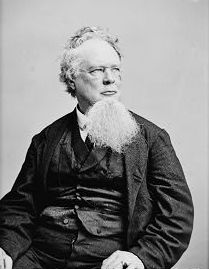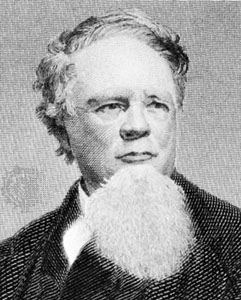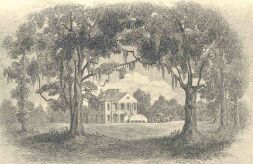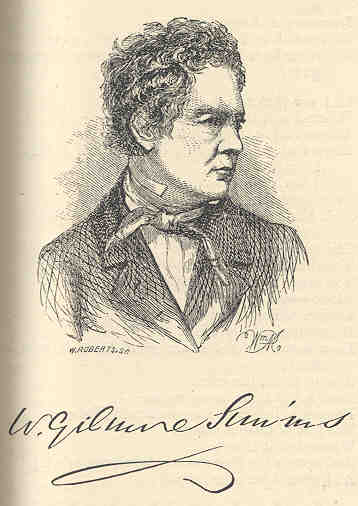|
William Gilmore Simms
Brady-Handy Photograph Collection Evert A. & George L. Duyckinck, The Cyclopedia of American Literature 257 (Philadelphia: William Rutter & Co., 1880)(Vol. 2):
In 1832 Simms visited New York and became acquainted with the growing literary circle emerging in that city. Upon the death of his wife, Simms remarried, this time to a daughter of a wealthy planter and was elected to the state legislature. Simms was also a novelist and essayist, but foremost a poet, and an acclaimed one.
WILLIAM GILMORE SIMMS.
William Gilmore Simms William
Gilmore Simms William
Gilmore Simms Poets
of the Civil War: Simms William
Gilmore Simms Simms, William Gilmore, 1806-1870 Charleston and Its Poets: Simms Bamberg
County Buried
at Magnolia Cemetery Introduction
to Literature: Antebellum Era Poems
Poetry William Gilmore Simms, Lyrical and Other Poems
(Charleston: Ellis & Neufville, 1827) __________________, The Vision of Cortes, Cain, and Other Poems (Charleston: James S. Burges, 1829) __________________, The Tri-Color (London: Wigfall & Davis, 1830) [online text] __________________, Southern Passages and Pictures (New York: George Adlard, 1839) [online text] ___________________, Donna Florida (Charleston: Burges and James, 1843) __________________, Helen Halsey: or, The Wwamp State of Conelachita. A Tale of the Borders (New York: Burgess, Stringer, 1845)(1844) __________________, Grouped Thoughts and Scattered Fancies (Richmond: William Macfarlane, 1845) [online text] __________________, The Charleston Book: A Miscellany in Prose and Verse (Charleston [South Carolina]: S. Hart, Sen., 1845) __________________, Areytos, or, Songs of the South (Charleston: Russell & Jones, 1846) __________________, Lays of The Palmetto (Charleston: John Russell, 1848) [online text] __________________, Sabbath Lyrics: or, Songs from Scripture. A Christmas Gift of Love (Charleston: Walker and James, 1849) [online text] __________________, The Cassique of Accabee: A Tale of Ashley River. With other pieces (New York: G.P. Putnam, 1849) [online text] (Charleston: J. Russell, 1849) __________________, The City of the Silent (Charleston: Walker & James, 1850) __________________, Poems: Descriptive, Dramatic, Legendary and Contemplative (New York: Redfield, 1853)(2 vols.) [vol.1: online text] __________________, Areytos or Songs and Ballads of the South with other Poems (Charleston, South Carolina: Russell & Jones, 1860) [online text] __________________, Selected Poems of William Gilmore Simms (Athens: University of Georgia Press, 1990)(James Everett Kibler, Jr. ed.) Correspondence Mary C. Simms Oliphant, Alfred Taylor Odell, & T.C. Duncan Eaves (eds.), The Letters of William Gilmore Simms (Columbia: University of South Carolina Press, 1952-1982)(6 vols.)
"Woodlands"—Simm's Home
near Barnwell, South Carolina Little Journeys: To the Homes
of American Authors Writings William Gilmore Simms, The Tri-color; or, The Three Days of Blood, in Paris. With some other pieces (London: Wigfall & Davis, 1830) __________________, Atalantis A Story of the Sea: In Three Oarts (New York: J. & J. Harper, 1832) __________________, Martin Farber (New York: J. & J. Harper, 1833) [online text] __________________, The Remains of Maynard Davis Richardson: With a Memoir of His Life (Charleston, South Carolina: O.A. Roorback, 1833) [online text] __________________, The Book of My Lady: A Melange (Boston: Allen & Ticknor, 1833) __________________, The Partisan: A Tale of the Revolution (New York: Harper & Brothers, 1835)(2 vols.) [vol. 1: online text] __________________, Mellichampe. A Legend of the Santee (New York: Harper & Bros., 1836) __________________, Pelayo: A Story of the Goth (New York: Harper & Bros., 1838) __________________, Carl Werner, an Imaginative Story: With Other Tales of Imagination (New York: George Adlard, 1838)(2 vols.) [vol.1: online text][vol. 2: online text] __________________, Richard Hurdis (Philadelphia: E. L. Carey & A. Hart, 1838) [vol. 1: online text] [ vol. 2: online text] __________________, Confession, or, The Blind Heart a Domestic Story (Philadelphia: Lea and Blanchard, 1841) __________________, The Kinsmen, or, The Black Riders of Congaree a tale (Philadelphia: Lea and Blanchard, 1841) __________________, Beauchampe; or, the Kentucky Tragedy (Philadelphia: Lea and Blanchard, 1842)(Chicago: S.A. Maxwell & Co., New & Revised ed., 1888) [online text] (New York: AMS Press, 1970) __________________, The Magnolia, or, Southern Apalachian (Charleston, South Carolina: P.C. Pendleton, and Burges & James, 1842-1843) __________________, The Geography of South Carolina: Being a Companion to the History of that State by William Gilmore Simms (Charleston, South Carolina: Babcock & Co., 1843) __________________, The Prima Donna: A Passage from City Life (Philadelphia: Louis A. Godey, 1844) __________________, Castle Dismal; or, The Bachelor's Christmas: A Domestic Legend (New York: Burgess, Stringer, 1844) __________________, The Yemassee: A Romance of Carolina (New York: Harper & Brothers, 1844) [online text] (Chicago: Belford, Clarke & Co., New & Revised ed., 1885) [online text] __________________, The Wigwam and the Cabin (New York: Wiley and Putnam, 1845)
__________________, Grouped Thoughts and Scattered Fancies (Richmond: Printed by Wm. Macfarlane, 1845) __________________, Views and Reviews in American Literature, History, and Fiction (New York: Wiley and Putnam, 1845) [online text] __________________, The Charleston Book: A Miscellany in Prose and Verse (Charleston [South Carolina]: S. Hart, Sen., 1845) __________________, Count Julian, or, The Last Days of the Goth a Historical Romance (Baltimore: W. Taylor, 1845) __________________, The Life of Francis Marion (New York: J. & H.G. Langley, 1846) [online text] __________________, The Life of the Chevalier Bayard (New York: Harper & Brothers, 1847) [online text] __________________, Charleston and Her Satirists (Charleston: Printed by James S. Burges, 1848) __________________, Atalantis: A Story of the Sea (Philadelphia: Carey and Hart, 1848) [online text] __________________, Life in America; or, The Wigwam and the Cabin (Aberdeen: G. Clark and Son, 1848) __________________, Father Abbot; or, The Home
Tourist A medley... __________________, The Lily and the Totem, or, The Huguenots in Florida (New York: Baker and Scribner, 1850) __________________, Flirtation at the Moultrie House in a Series of Letters from Miss Georgiana, to her Friends in Georgia ... with other letters (Charleston [South Carolina] : Printed by Edward C. Councell, 1850) __________________, Norman Maurice, Or, The Man of the People an American Drama in Five Acts (Richmond: Jno. R. Thompson, 1851) __________________, Katharine Walton: or, The Rebel of Dorchester (Philadelphia: A. Hart, 1851) __________________, As Good as a Comedy: or, The Tennesseean's Story __________________, The Golden Christmas (Charleston: Walker, Richards and Co., 1852) __________________, Michael Bonham; or, The Fall of Bexar, a Tale of Texas, in five parts (Richmond: J.R. Thompson, 1852) __________________, As Good as a Comedy, or, The Tennessean's Story __________________, The Sword and the Distaff: Or, "Fair, Fat and Forty." A Story of the Sout, at the Close of the Revolution (Philadelphia: Lippincott, Grambo & Co., 1853) [online text] __________________, Marie de Berniere: A Tale of the Crescent City, Etc. Etc. Etc (Philadelphia: Lippincott, Grambo, and Co., 1853) [online text] __________________, Egeria: Or Voices of Thought and Counsel, for the Woods and Wayside (Philadelphia: E.H. Butler & Co., 1853) [online text] __________________, Norman Maurice; Or, The Man of the People. An American Drama.: An American Drama (Philadelphia: LIppincott, Grambo, & Co., 1853) __________________, The Scout: Or, The Black Riders of Congaree (New YorkL: Redfield, New and rev. ed., 1854) __________________, Woodcraft: Or, Hawks about the Dovecote, a Story of the South at the Close of the Revolution (New York: Redfield, 1854) __________________, The Forayers; or, The raid of the dog-days (New York: Redfield, 1855) [online text] __________________, Charlemont: or, the Pride of the Village—A Tale of Kentucky (New York: Redfield, 1856)(New York: W.J. Widdleton, 1866)
__________________, Eutaw, a Sequel to the Forayers (New York: Redfield, 1856) __________________, The Cassique of Kiawah: A Colonial Romance __________________, The History of South Carolina from Its First European Discovery to Its Erection Into a Republic (New York: Redfield, New and Revised ed., 1860) [online text] __________________, The Life of Nathanael Greene, Major-general in the Army of the Revolution (New York: Derby & Jackson, 1861) [online text] __________________,
Sack and Destruction of the City of Columbia, S.C. (Power Press of Daily Phoenix, 1865)(Columbia, South Carolina:
Oglethorpe University Press, 1937) __________________, The Life of Captain John Smith: The Founder of Virginia (J.E. Potter & Co., 1867) __________________, Vasconselos: A Romance of the New World (New York: W.J. Widdleton, 1868) [online text] __________________, Eutaw, a Sequel to the Forayers: Or, The Raid of the Dog-days, a Tale of the (New York: A.C. Armstrong & Son, 1882) [online text] __________________, Border Beagles: A Tale of Mississippi (Chicago: Donohue, Henneberry & Co., 1890) [online text] __________________, Stories and Tales (Columbia, South Carolina: S.C. : University of South Carolina Press, Centennial ed., 1974) __________________, Joscelyn: A Tale of the Revolution (Columbia, South Carolina: University of South Carolina Press, Centennial ed., 1975) __________________, Poetry and the Practical (Fayetteville: University of Arkansas Press, 1996)(James E. Kibler ed.) __________________, The Forayers or the Raid of the Dog Days: Selected Fiction of William Gilmore Simms (Fayetteville: University of Arkansas Press, 2003)(David W. Newton ed.) Bibliography John Erskine, Leading American Novelists (New York: Henry Holt, 1910)(including a section on Simms) John Caldwell Guilds, Simms: A Literary Life (Fayetteville: University of Arkansas Press,1992) ________________, Long Years of Neglect: The Work and Reputation of William Gilmore Simms (Fayetteville: University of Arkansas Press, 1988) John C. Guilds & Caroline Collins (eds.), William Gilmore Simms and the American Frontier (Athens: University of Georgia Press, 1997) [book review] James E. Kibler, Jr. & Keen Butterworth, William Gilmore Simms: A Reference Guide (1980) James E. Kibler, Jr., The Poetry of William Gilmore Simms: An Introduction and Bibliography (Spartanburg, South Carolina: Published for the Southern Studies Program, University of South Carolina, Reprint Co., 1979) _______________, Pseudonymous Publications of William Gilmore Simms Samuel Albert Link, Pioneers of Southern Literature: William Gilmore Simms, The Novelist, the Poet (Nashville: Barbee & Smith, 1896) _______________, Pseudonymous Publications of William Gilmore Simms (Athens: University of Georgia Press Press, 1976) Edd Winfield Parks, William Gilmore Simms as Literary Critic (Athens: University of Georgia Press, 1961) J.V. Ridgely, William Gilmore Simms (New York: Twayne Publishers, 1962) A.S. Salley, Catalogue of the Salley Collection of the Works of Wm. Gilmore Simms (New York: B. Franklin, 1969) Carol Therese Steinhagen, Plantation and Wilderness: Themes of Aggression and Regression in the Border Romances of William Gilmore Simms (Thesis, University of Illinois, Urbana-Champaign, 1974) Betty Jo Strickland, The Short Fiction of William Gilmore Simms A Critical Description and Checklist (Ph.D. thesis, University of Georgia, 1975) William Peterfield Trent, William Gilmore Simms (Boston: Houghton, Mifflin, 1892) [online text] James Perrin Warren, Culture of Eloquence: Oratory and Reform in Antebellum America (University Park, Pennsylvania: Pennsylvania State University Press, 1999) Charles S. Watson, From Nationalism to Secessionism: The Changing Fiction of William Gilmore Simms (______________1993) Mary Ann Wimsatt, The Major Fiction of William Gilmore Simms: Cultural Traditions and Literary Form (Baton Rouge: Louisiana State University Press, 1989) Bibliography: Articles George C. Longest, "William Gilmore Simms," in Eric L. Haralson (ed.), Encyclopedia of American Poetry: The Nineteenth Century (Chicago: Fitzroy Dearborn, 1998) "William Gilmore Simms," in Samuel Albert Link, 1 Pioneers of Southern Literature 149-221 (Nashville, Tennessee & Dallas, Texas: Publishing House M.E. Church, South, Barber & Smith, Agents, 1899)(Vol. 1) John C. Guilds, "The Achievement of William Gilmore Simms: His Short Fiction," in Lewis P. Simpson (ed.), The Poetry of Community: Essays on the Southern Sensibility of History and Literature (Atlanta: School of Arts and Sciences, George State University, 1972) Elmo Howell, William Gilmore Simms and the American Indian, 5 (2) South Carolina Review __ (1973) Edgar Allan Poe, Review of Simms' The Partisan, Southern Literary Messenger (January, 1836) Jon L. Wakelyn, The Politics of a Literary Man: William Gilmore Simms (Westport, Connecticut: Greenwood Press, 1973) Charles S. Watson, Simms and the Civil War: The Revolutionary Analogy, 24 (2) Southern Literary Journal 62 (1992) Oscar Wegelin, A Bibliography of William Gilmore Simms (Hattiesburg, Mississippi, 3rd ed., 1941) Mary Ann Wimsatt, "William Gilmore Simms," in Louis D. Rubin (gen ed.), The History of Southern Literature 108-117 (Baton Rogue, Louisiana State University Press, 1985) Simms's Poem for the Opening of the New Theatre, 28 Southern Literary Journal 24-31 (Spring, 1996) A Sociology of the Civil War: Simms's Paddy McGann, 28 Southern Literary Journal 3-23 (Spring 1996) "The Soul of a Man!": William Gilmore Simms and the Myths of Southern Manhood. 15 Journal of the Early Republic 477-500 (Fall 1995) Some Unrecorded English Reviews of W. G. Simms, 47 Mississippi Quarterly 557-66 (Fall 1994) The Major Fiction of William Gilmore Simms (Book Review), 99 Sewanee Review 483-490 (Summer 1991) The Reconstruction of a Poet (Book Review), 44 Mississippi Quarterly 203-207 (Spring 1991) The Major Fiction of William Gilmore Simms (Book Review), 62 American Literature 110-111 (March 1990) The Major Fiction of William Gilmore Simms (Book Review), 9 Journal of the Early Republic 403-404 (Fall 1989) William Gilmore Simms and Current Literary Criticism (Review Article), 43 Mississippi Quarterly 105-108 (Wiinter 1989/1990) The Major Fiction of William Gilmore Simms (Review), 43 Mississippi Quarterly 85-95 (Winter 1989/1990) That National Story: Conflicting Versions and Conflicting Visions of the Revolution in Kennedy's Horse-Shoe Robinson and Simms's The Partisan, 21 Southern Literary Journal 64-85 (Fall 1988) The First Simms Letters: Letters from the West (1826), 19 Southern Literary Journal 81-91 (Spring 1987) The Maturing of Simms's Short Fiction: The Example of Oakatibbe, 38 Mississippi Quarterly 99-117 (Spring 1985) Simms's Last Novel, The Cub of the Panther, 17 Southern Literary Journal 108-119 (Spring 1985) The Letters of William Gilmore Simms, 1834-1870 (Book Review, Volume 6), 30 Civil War History 177-178 (June 30, 1984) Letters of William Gilmore Simms, 1834-1870 (Book Review, Volume 6), 37 Mississippi Quarterly 120-123 (Winter 1983/1984) James E. Kibler, Sound and Sense in Simms' Poetry,
31 (2) Southern Literary Journal 12-18 (1999)
Evert A. & George L. Duyckinck, The Cyclopedia of American Literature 259 Research Resources William
Gilmore Simms Papers Manuscript Poems |



